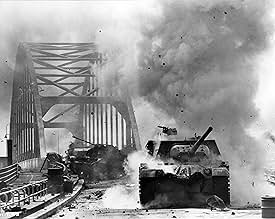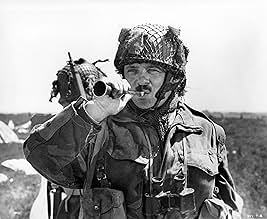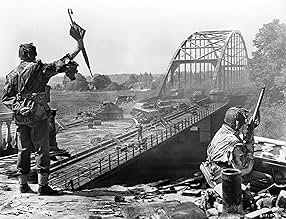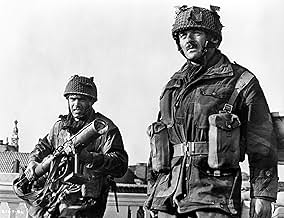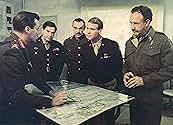Operação Market Garden, setembro de 1944: Os Aliados tentam capturar várias pontes estrategicamente importantes na Holanda na esperança de quebrar as linhas alemãs.Operação Market Garden, setembro de 1944: Os Aliados tentam capturar várias pontes estrategicamente importantes na Holanda na esperança de quebrar as linhas alemãs.Operação Market Garden, setembro de 1944: Os Aliados tentam capturar várias pontes estrategicamente importantes na Holanda na esperança de quebrar as linhas alemãs.
- Direção
- Roteiristas
- Artistas
- Ganhou 4 prêmios BAFTA
- 7 vitórias e 5 indicações no total
- Underground Leader's Wife
- (as Marlies Van Alcmaer)
- Underground Leader's Son
- (as Eric Van't Wout)
- Gen. Blumentritt
- (as Hans Von Borsody)
- Direção
- Roteiristas
- Elenco e equipe completos
- Produção, bilheteria e muito mais no IMDbPro
Avaliações em destaque
The movie is flawless. As mentioned above, it is surprisingly accurate. As one would expect from the cast, acting is first rate. Not a single scene is wasted.
This is a "must see" movie for anyone who appreciates movie making.
His P 47s may be mock ups, but he used genuine World-War-II era M-4 "Sherman" tanks. (God knows how he managed to muster them.) I can't vouch for the German tank -- there is only one shown on screen and it could pass for a Panther. I also admire him for having the daring to make a movie about an unmitigated Allied defeat. As a whole, movies in this genre depict a victory on the part of the nations producing the movie in the first place.
"The Enemy Below," "Zulu," "Torpedo Bay," "Die Brucke," just to give American, British, Italian, and German examples. The list goes on. About the only time we're permitted to witness defeats for "our side" is during a heroic last stand against overwhelming odds ("Bataan") or when the defeat is the result of dirty pool ("Pearl Harbor"). But here, with no excuses, Attenborough delivers a different message entirely.
The performances are as good as can be expected from actors who have so little time to develop their characters. The battle scenes are realistic enough, without their shoving our noses into spilled intestines.
Attenborough is not a splashy director but he has a couple of things go on that are worth noticing. The Dutch citizens who first greet the Allied troops joyfully as liberators wind up being slaughtered and their cities destroyed by the war that is thrust on them. Civilian suffering tends to get short shrift unless one of them is Sofia Loren or somebody. Another worthwhile touch, a small one. The British politely take over one of those large super-scrubbed middle-class Dutch homes as a hospital -- "just for the slightly wounded, Ma'am." And as the first soldiers enter they step over two kids playing with a toy train on a thick creamy rug -- and a few drops of blood sprinkle the carpet.
Two other observations. "The Longest Day" is sometimes compared unfavorably to this film for a number of reasons, many of them justified. But "The Longest Day" was made under restrictions that had been lifted by the time this movie was produced. Zanuck wanted to show more of the slaughter at Omaha Beach but was prevented from doing so. He was similarly prevented by prevailing folkways from showing Allied troops as more brutal. And he originally filmed the closing scene of the movie not with a triumphant parade of victorious infantrymen marching up the slopes to a peppy military tune but with an forlorn, exhausted, empty grunt, sitting at the water's edge and listlessly tossing pebbles into the waves. The scene had to be deleted. A bothersome thing about "A Bridge Too Far" is that, at least as I've seen it on TV, I can't easily tell who is where. In Ryan's book it's easy enough to follow events and characters but, as edited, this movie is pretty confusing. When five of the major actors all show up together on a balcony, it came as a big surprise. I thought Connery and one or two of the others were still trapped behind German lines! I don't know whether this confusion is due to poor editing or a ministroke.
It helps that the ensemble cast is great - perhaps the best ever assembled - and the characterization, though a bit thin (as in most war movies), is certainly good enough considering how heavily the plot dominates. The film's one major weakness is that it telegraphs the battle's result from too early on; all the smart characters think that the operation will be a disaster, and lo and behold, it's a disaster.
I love this movie anyway, maybe because of the production style, which is more realistic than the cornball war films of previous decades but not quite so over-the-top as "Private Ryan." The battles are both thrilling and terrifying, a nicely struck balance. When the end credits roll, I always feel tired - like the characters - which is a testament to how involving (and effective) the movie is.
The final scene with Liv Ulman and Lawrence Olivier evacuating their estate turned into a graveyard is practically worth the price of admission by itself.
This is a sweeping, big budget epic movie with a star-studded cast. Definitely unfocused, but Attenborough pulls it off with considerable historical accuracy and his signature deft touch retelling of this sprawling military debacle. He makes excellent use of his tremendous cast, instead of just having them making appearances. He has plenty of subtle touches like that final scene.
The reception of the movie was hurt I think by its proximity to the Vietnam war. But it has aged very well.
Você sabia?
- CuriosidadesSir Dirk Bogarde's portrayal of General Browning was highly controversial, and several friends of the late General suggested that, had Browning still been alive in 1977, he would have sued director Sir Richard Attenborough and screenwriter William Goldman for libel. Bogarde took issue with the portrayal during filming, having known Browning personally, as he was a member of Field Marshal Bernard L. Montgomery's staff during the war. Bogarde was upset by the personal criticism he received following the release of the film, especially as he had not been involved in the writing of the script. Although Attenborough publicly took responsibility for the controversy, his relationship with Bogarde was never the same again. Browning's son said he believed his father was made the fall guy for the failure of Operation Market Garden in the film because the producers knew there would have been too much flak if they went after Montgomery.
- Erros de gravaçãoThe Allied plans for Market-Garden were correctly shown as falling into German hands from a downed Allied plane. In the film, they were ignored. In actuality, they were turned over to German paratroop expert General Student, who realized their accuracy and importance and used them in determining his troop deployments.
- Citações
[an SS officer is approaching under a white flag]
Major Harry Carlyle: Rather interesting development, sir.
[to the German]
Major Harry Carlyle: That's far enough! We can hear you from there!
SS Panzer Officer: My general says there is no point in continuing this fighting! He wishes to discuss terms of a surrender!
Major Harry Carlyle: Shall I answer him, sir?
Lt. Col. John Frost: Tell him to go to hell.
Major Harry Carlyle: We haven't the proper facilities to take you all prisoner! Sorry!
SS Panzer Officer: [confused] What?
Major Harry Carlyle: We'd like to, but we can't accept your surrender! Was there anything else?
[German officer walks off]
Lt. Col. John Frost: Well, that's that.
[the officer returns to General Bittrich, and they converse in German]
SS Panzer Officer: They rejected our surrender offer. What are your orders, Herr General?
Lt. General Bittrich: Flatten Arnhem.
- Versões alternativasThe UK cinema release was cut by the BBFC in order to get an "A" rating by editing out the word "fucking" in the scene where James Caan holds the doctor at gunpoint, while Elliott Gould's line "Roll the fuckers" was dubbed over with "Roll it, fellas." In addition, a shot of a dead soldier with his intestines exposed was cut, and closeups of men's bloody faces during the assault on Arnhem were also removed. The cuts were restored in the 15-rated video and DVD versions.
- ConexõesEdited into Meu Nome é Modesty Blaise (2004)
- Trilhas sonoras3rd Movement
(from Brandenburg Concerto No. 6 in B-Flat Major, BWV. 1051) (uncredited)
Music by Johann Sebastian Bach
Principais escolhas
Detalhes
- Data de lançamento
- Países de origem
- Idiomas
- Também conhecido como
- Un puente demasiado lejos
- Locações de filme
- Nijmegen, Gelderland, Países Baixos(Nijmegen Bridge scenes and battle sequence)
- Empresa de produção
- Consulte mais créditos da empresa na IMDbPro
Bilheteria
- Orçamento
- US$ 27.000.000 (estimativa)
- Faturamento bruto nos EUA e Canadá
- US$ 50.750.000
- Faturamento bruto mundial
- US$ 50.750.000
- Tempo de duração2 horas 55 minutos
- Cor
- Proporção
- 2.35 : 1
Contribua para esta página




